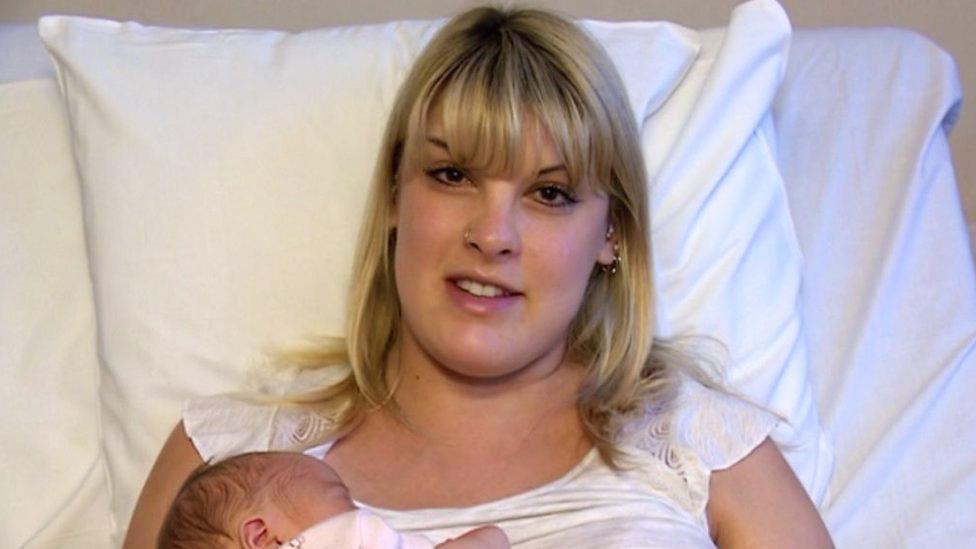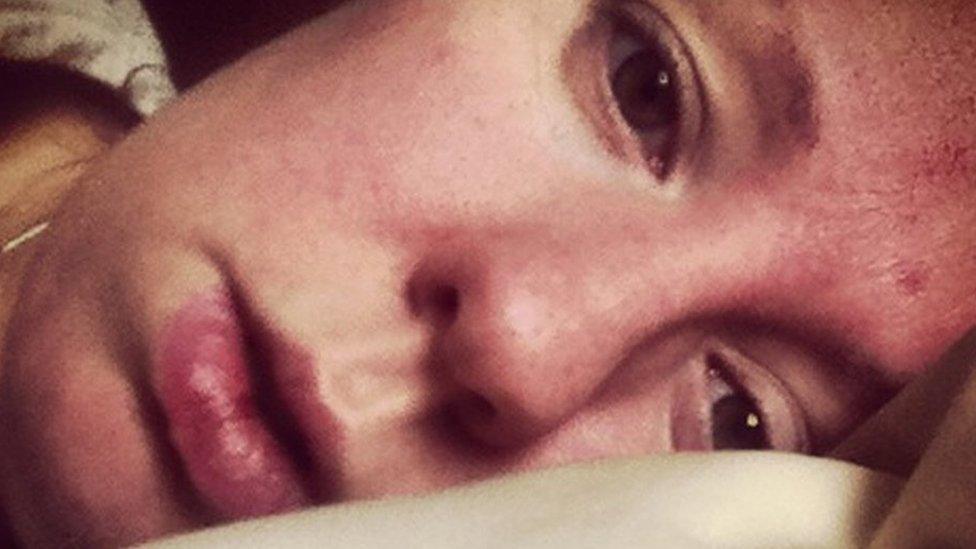Hyperemesis: Scientists make pregnancy sickness cure breakthrough
- Published

Susie Verrill could not leave her bedroom for five months during her pregnancies due to constant sickness
Scientists say they have discovered why some women become extremely sick during pregnancy, bringing them one step closer to a potential cure.
Babies produce a hormone that can cause severe sickness, known as hyperemesis gravidarum (HG), according to a study.
Exposure to the GDF15 hormone ahead of pregnancy could be a new treatment.
Prof Sir Stephen O'Rahilly, from the University of Cambridge, said: "The more sensitive a mother is to this hormone, the sicker she will become."
He added: "Knowing this gives us a clue as to how we might prevent this from happening."
Between one and three in 100 pregnancies, external are thought to be affected by HG. It can threaten the life of the foetus and many women need intravenous fluids in hospital to prevent dehydration.
Some mothers report being sick up to 50 times a day throughout their pregnancies.

Susie Verrill has documented her horrific battle with extreme morning sickness to help raise awareness
Susie Verrill, 35, who is engaged to Olympian Greg Rutherford, said her experience of HG was so traumatic it made her consider a termination.
The mother-of-three, who lives in Woburn Sands, Buckinghamshire, had HG for two out of her three pregnancies and is contacted by women suffering from it every day.
"I had a real sense of an inability to exist, I couldn't be around my family," she said. "I considered not carrying on my pregnancies because it was so terrible and that is really common when you have HG.
"I couldn't breathe without retching and I was stuck in my bedroom for five months both times. You have to make your world very small to survive and Greg became my carer.
"It affects everything and you are just trying to get through each day before the baby is born."

Susie says her partner Greg Rutherford became her carer during two of her pregnancies
The Princess of Wales famously suffered with HG during all three of her pregnancies and was admitted to hospital during her first pregnancy.
Previous studies suggested pregnancy sickness could be related to GDF15 but researchers said the "full mechanistic understanding" was "lacking".
The new research, external, published in Nature and involving scientists at the University of Cambridge and researchers in Scotland, the USA and Sri Lanka, found that the degree of sickness was related to the amount of hormone produced in the womb - and prior exposure.
They studied women at the Rosie Maternity Hospital in Cambridge and found those with a genetic variant putting them at a greater risk of HG had lower levels of the hormone, while women with the blood disorder beta thalassemia, which causes very high levels of GDF15 prior to pregnancy, experienced very little nausea or vomiting.
Preventing the hormone from accessing its "highly specific receptor in the mother's brain" will "ultimately form the basis for an effective and safe way of treating this disorder," Prof Sir Stephen, director of the Medical Research Council metabolic diseases unit at the University of Cambridge, said.

Vivienne Kumar's pregnancy sickness was so severe that she was sick 10 times an hour
Mother-of-two Vivienne Kumar from Bedford was sick 10 times an hour during her pregnancies and the only time she was not vomiting was while she was asleep.
"It's not just morning sickness, it is debilitating," she said. "Once you go through it you never really recover, it stays with you forever.
"I felt really shut off from the world and like I was in my own bubble. I didn't see the end point. It is really hard to leave the house.
"I was so lucky to have the support of my husband and mum, without them I may not have been as motivated to continue."
When she became pregnant for a third time she was admitted to hospital for eight days and went on to lose the baby.
"I was under a lot of different medications and I was given steroids which didn't work and unfortunately the baby didn't survive that," she added.
Charlotte Howden, chief executive of the charity Pregnancy Sickness Support, which supports women with HG, said the health issue had been neglected for too long.
She said: "I'm so grateful for the dedication of the researchers, because this isn't a condition that really ever made the headlines until the now Princess of Wales suffered with it.
"It wasn't an area of research that people were really interested in. It was just morning sickness - why should we care?"

Follow East of England news on Facebook, external, Instagram, external and X, external. Got a story? Email eastofenglandnews@bbc.co.uk, external or WhatsApp 0800 169 1830
Related topics
- Published15 May 2019

- Published15 May 2019

- Published24 March 2018

- Published4 September 2017
